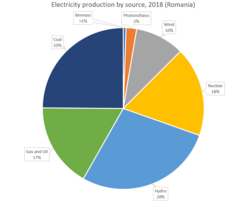Energy in Romania


Energy in Romania describes energy and electricity production, consumption and import in Romania.
Romania has significant oil and gas reserves, substantial coal deposits and it has considerable installed hydroelectric power. However, Romania imports oil and gas from Russia and other countries. To ease this dependency Romania seeks to use nuclear power as an alternative for electricity generation.
Overview
Electric power in Romania is dominated by government enterprises, although privately operated coal mines and oil refineries also existed. Accordingly, Romania placed an increasingly heavy emphasis on developing nuclear power generation. Electric power was provided by the Romanian Electric Power Corporation (CONEL). Energy sources used in electric power generation consisted primarily of nuclear, coal, oil, and liquefied natural gas (LNG).
The country has two nuclear reactors, located at Cernavodă, generating about 18–20% of the country's electricity production.
Statistics
|
|
|
CO2 emissions: |
Energy strategy
|
Coal (25%) |
Wind renew. (10%) |
A review of the energy strategy took place in 2022.
Gas production currently around 25m m3/d with a potential for increase from the 100billion m3 on shore reserves. Offshore reserves are estimated at 40billion m3. There is a potential for LNG production and Romania could become a major energy supplier to Europe.[2]
Renewable energy:
- 208 hydrological plants produce about 30% of Romania's energy.
- Wind, photovoltaic and biomass produce 16% of Romania's energy and is expected to rise to 30%.[2]
Nuclear energy: Currently producing around 20% of Romanian needs, two new reactors are scheduled to be built with help from the USA.[2]
Interconnectivity: Improved connections for the supply of gas and electricity to/from neighbouring countries are planned.
Fossil fuels
Oil


Possessing substantial oil refining capacities, Romania is particularly interested in the Central Asia – Europe pipelines and seeks to strengthen its relations with some Persian Gulf states. Refining capacity was reduced by 2018, with just 5 refineries remaining and an overall refining capacity of approximately 13.7Mt per annum. Romania's refining capacity far exceeds domestic demand for refined petroleum products, allowing the country to export a wide range of oil products and petrochemicals—such as lubricants, bitumen, and fertilizers—throughout the region.[3]
Gas
Romania has large natural gas reserves and produces most of the gas for the countries needs.
The national natural gas transmission system in Romania is owned by Transgaz a state-owned company.
Interconnector pipelines connect Romania with Hungary, Bulgaria, Ukraine and onward connections to Turkey, Greece, North Macedonia, Azerbaijan and Austria.
Electric power
In 2022 and 2023 improved connections were made to connect with and bring neighbouring Moldova into the European grid, with Romania supplying Moldova with electricity.[4]
Nuclear
Romania has two nuclear reactors located at Cernavodă with 1,300 MW capacity, the first became operational in 1996, the second in 2007. In 2020 nuclear produced 11.5 TWh of electricity, being 20% of Romania's electricity generation.[5]
Nuclear waste is stored on site at reprocessing facilities.
Renewable energy
| Achievement | Year | Achievement | Year | Achievement | Year |
|---|---|---|---|---|---|
| 10% | 1996 | 15% | 1997 | 20% | 2008[1] |
Renewable energy includes wind, solar, biomass and geothermal energy sources.
Wind energy
Electricity transmission system operator Transelectrica is scheduled to have a 3GW wind energy capacity by 2026.[6] 1.9 GW of offshore wind is planned for 2027-28.
Solar power
Solar power expanded in 2013 but for the next 10 years remained fairly static with around 1,300 MW capacity. Plans from 2023 include a doubling of capacity after the law was changed in 2023 making it easier to obtain planning permission.[7]
Biomass
Biomass provides around 1% of electricity generation capacity.
Climate change

In the decade between 1989 and 1999, Romania saw decrease of its greenhouse gas emissions by 55%. This can be accounted for by a 45% decrease in energy use due to languishing economy, and a 15% decrease in its carbon intensity of energy use. In this period of time the carbon intensity of Romania's economy decreased by 40%, while Romania's GDP declined 15%. Romania's GDP has recovered significantly since then.[8]
There has been a big push towards renewable energy.
See also
- Energy policy of Romania
- Geothermal power in Romania
- Hydroelectricity in Romania
- Renewable energy by country
References
- ^ a b "Energy consumption in Romania". 2020.
- ^ a b c "Momentum for change in the Romanian energy sector". 5 December 2022.
- ^ "Petrochemical industry in Romania". 21 May 2018.
- ^ "Romania to Supply Power to Moldova After Ukraine Facilities Bombed". 13 October 2022.
- ^ "Nuclear Power in Romania". June 2023.
- ^ "Romanian grid ready for 3 GW in wind power connections by 2026". Retrieved 8 August 2023.
- ^ "Solar park of over 1 GW in Romania to include 500 MW in batteries". 23 February 2023.
- ^ Climate Analysis Indicators Tool (CAIT)

